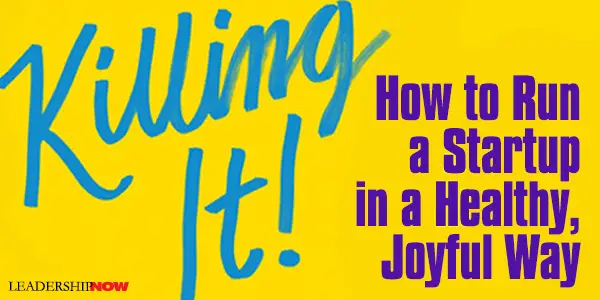 |
 |
01.22.18

Killing It! How to Run a Startup in a Healthy, Joyful Way
A Entrepreneurship has never seemed so popular as it is today no doubt because it is easier than ever to start a company. Especially in the tech sector, barriers to entry have fallen, and there is greater access to risk capital for startups. Steve Anderson, the founder of Baseline Ventures, said, “Ten years ago, you needed $5 million to start a business. Today, you need $70 and some coding skills.” It is a golden age for entrepreneurs. But with the implied success is a dark side that is rarely talked about. The cost is often the entrepreneur’s physical and mental health and the impact their work has on their family and friends. Sheryl O'Loughlin tackles this head-on in Killing It! The entrepreneur’s personal life is often the hidden cost of building an uber-successful career or business. Sheryl who has taught entrepreneurship at the Stanford Graduate School of Business understands the ups and downs of being an entrepreneur. She served as the CEO of Clif Bar, was the Co-Founder and CEO of Plum Organics and is now CEO of REBBL. In Killing It! she offers empathetic support for entrepreneurs with candid discussions about her own experience and those of other entrepreneurs she has known. Many people start a business without really knowing what they are getting into. Starting a business for money is a bad bet since around 95 percent of startups fail. There needs to be a real love for the problem you’re trying to solve. Professor, social entrepreneur and investor Will Rosenzweig, told Sheryl, “Many thought they were going to launch a business coming out of school, not necessarily to solve a problem, but the problem they were trying to solve was their own unemployment and livelihood.” Execution Once you get past the idea, execution is everything. “It’s this build phase that catches many entrepreneurs by surprise—after so much excitement; they’re shocked at how mundane it all is. Remember the Buddhist saying, ‘After enlightenment, the laundry.’ Oh, and how much laundry there is.” Sheryl says you have to make others love your business as well and connect to the company’s purpose—and it’s ongoing. You do that by inviting others to be part of the story. You help others to connect their personal passions to the company’s purpose. You and your team need to live the experience your customers have with the product. You need to be a leader that models love, compassion and care and hire people that can do the same. At the same time, love can blind you to realities. So “let reality in,” she cautions. “You don’t have to love every moment, but you do have to love enough of them.” Entrepreneurs believe they have to do it all. Show no weakness. But we do have weaknesses. We need to talk to each other. “When entrepreneurs don’t rely on one another, they don’t harness the power of possibility. Too often we approach our work from a mind-set of scarcity and not one of abundance—a mistake that holds us back. The entrepreneurial profession requires that a person be vulnerable in order to remain healthy, and it’s critical to have a space in your life with others that allows for that.” When it comes to running your own company, business and personal issues are all intertwined. Friendships Hang on to your friends. “Friendships are crucial for the emotional well-being of an entrepreneur, but they are often the first thing to hit the chopping block when things get busy.” There are three good reasons for this:
Risk-Taking I’ve risked it all is not a good strategy. “A skilled entrepreneur is the one who will assign risk to somebody else. The entrepreneur will that the resources when they are there. Would you go climbing without the proper gear? Probably not, and you shouldn’t approach business any differently. Entrepreneurship is about minimizing risk.” You need a Plan B because most of the time you will need it. Most ventures will fail. “You can’t make the mistake of thinking you’ll beat the odds just because you have a fancy degree, stellar experience, and great contacts.” Self-Worth We are conditioned to believe that money equals success. It’s vital, but your self-worth isn’t tied to the company’s net worth. “To keep a healthy self-worth/net worth separation, you have to continually ask yourself what role money is serving in your endeavor? Is money becoming your identity?” What are you proud of? We talk about family values, but they aren’t as easy to measure as money. Your self-worth is probably the most important message of her book. Self-worth “is the quality that must be the strongest and most fight-ready before you start a company.” No matter what happens, you are not the company. “What must endure is a deep feeling that you are living in line with your values, that you are fundamentally grounded. You have to have resilience, and you have to know that you can fall down, get back up, and wipe yourself off, aware that deep down you are okay. Without this strong sense of self-worth, no matter how supportive your partner or your kids or your friends, no matter how bold or humble you are, you are at risk, even if your company isn’t.” Most new businesses fail. And most entrepreneurs would do it all over again. But if you know up front the dark side of entrepreneurship, hopefully, the journey will end up happier and healthier for you. Before you start a company, think of entrepreneurship in terms of your life as a whole. Invest in your wellbeing. Killing It! is a great place to start. 
Posted by Michael McKinney at 03:39 PM
|
BUILD YOUR KNOWLEDGE
 

How to Do Your Start-Up Right STRAIGHT TALK FOR START-UPS 
Grow Your Leadership Skills NEW AND UPCOMING LEADERSHIP BOOKS 
Leadership Minute BITE-SIZE CONCEPTS YOU CAN CHEW ON 
Classic Leadership Books BOOKS TO READ BEFORE YOU LEAD |